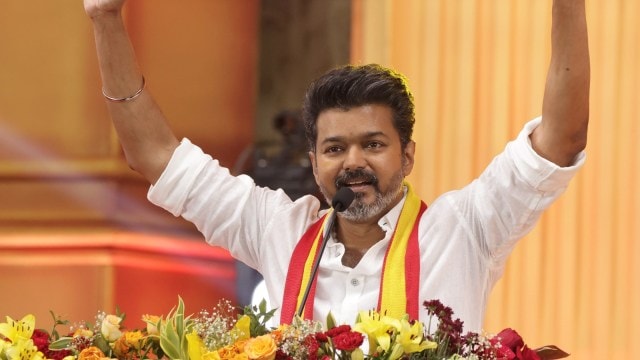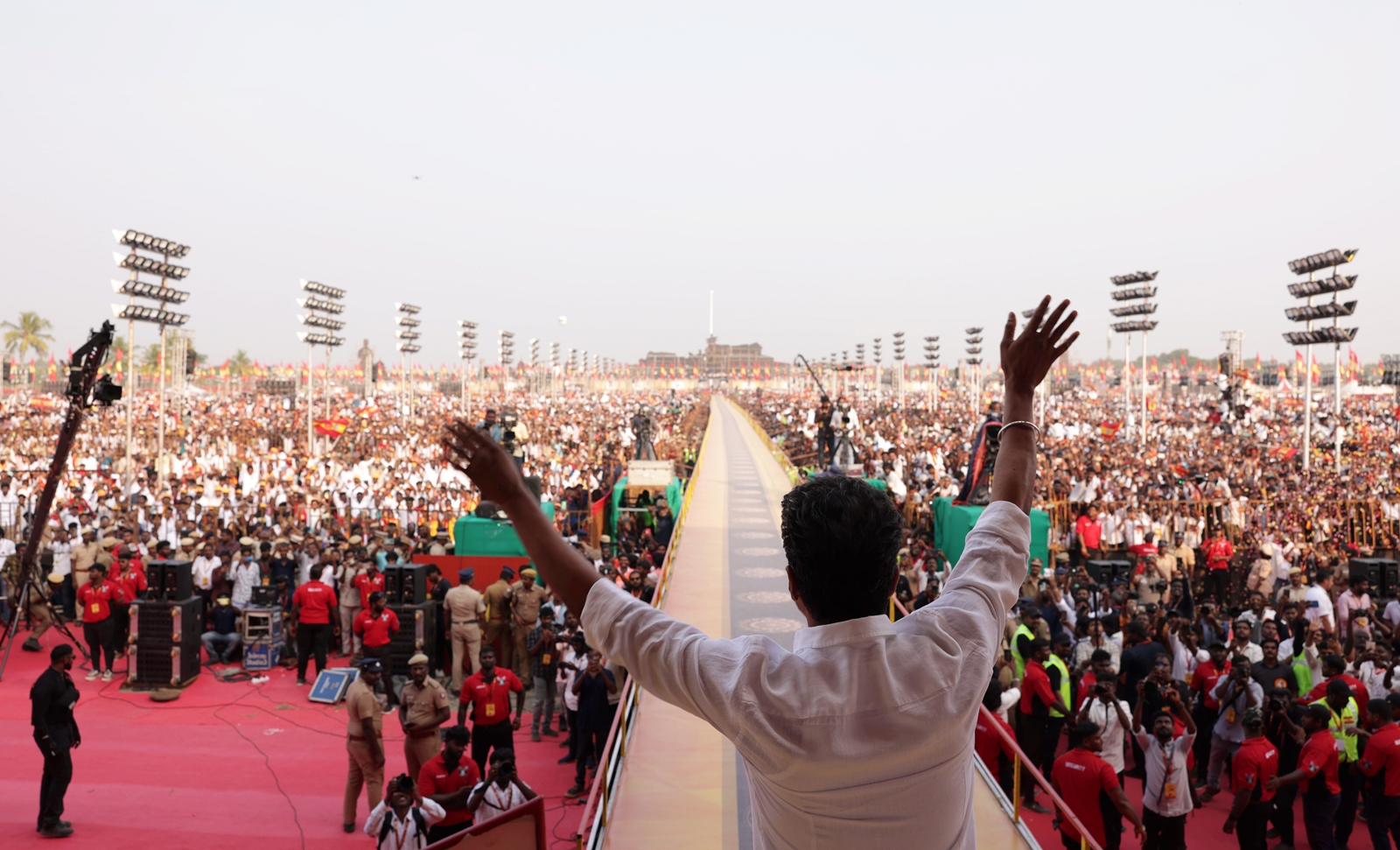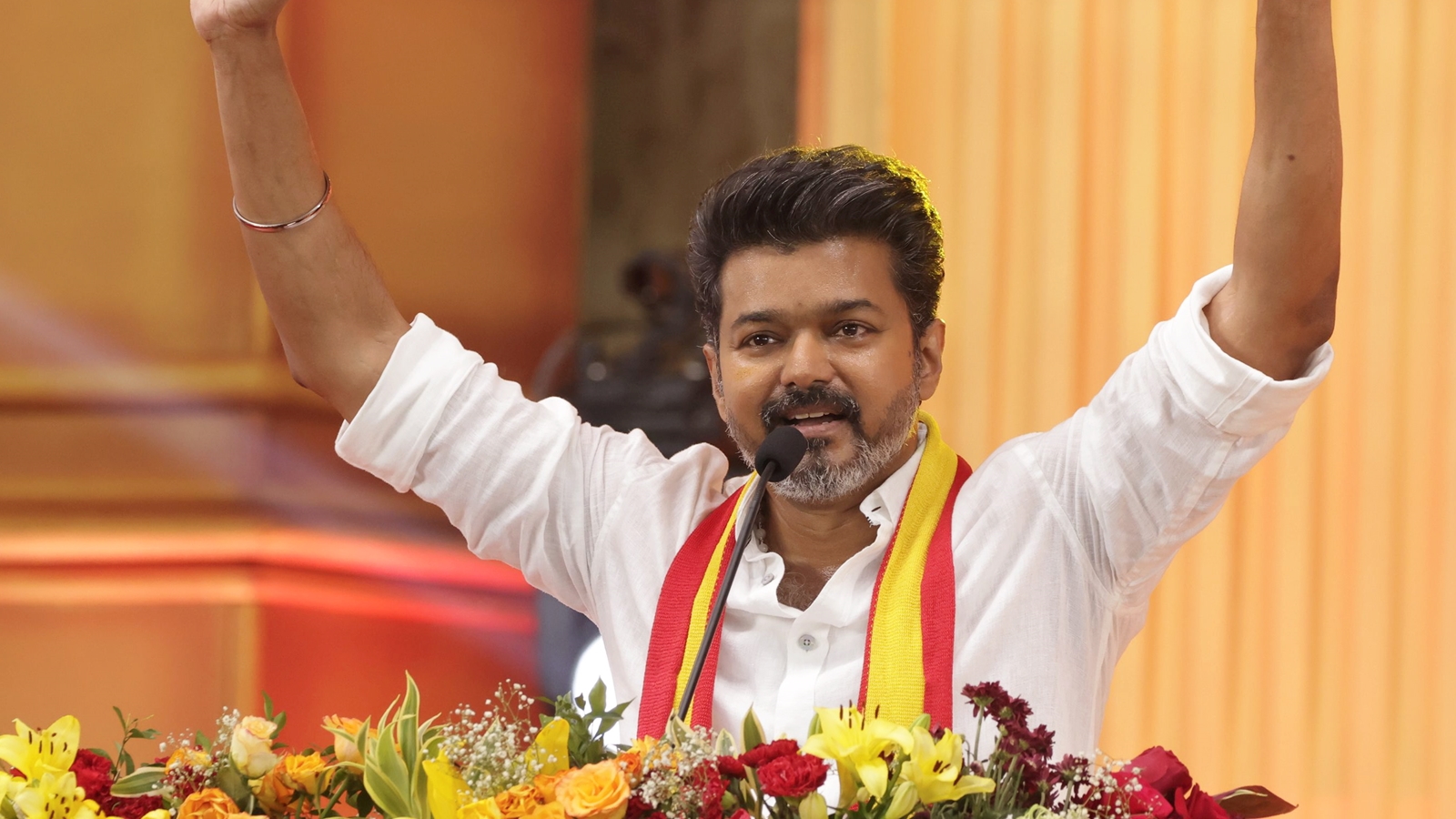
Written by Karthick Ram Manoharan
Some years ago, a local BJP leader in Tamil Nadu “accused” a popular actor of being a Christian, as if being one is a crime. The celebrity in question, however, did not back down and, instead, flaunted his name and identity in a press release that followed. Joseph Vijay could count on the millions of fans who support and adore him, looking beyond his religious or caste identity. In his speech at the first state conference of his party Tamilaga Vettri Kazhagam (TVK) on October 27, Vijay expressed his opposition to communal politics, alluding to the BJP. He also alleged that corruption hid behind slogans about the “Dravidian Model”. But does Vijay’s emergence as a political figure really mark a change from Dravidianism?
Even before he floated TVK, Vijay’s political ambitions were well-known. For a long time, in Kollywood’s hierarchy of stardom, Vijay was on the second-rung, along with his close competitor Ajith Kumar. Rajinikanth and Kamal Haasan, the stars at the top, had also sought to enter politics. Rajinikanth, the celebrated superstar, made some incoherent statements about bringing together spirituality and governance, but dropped out of the political race altogether. Haasan launched his outfit Makkal Needhi Maiam, which had no electoral success. To survive in the theatre of politics, the thespian needed to align with bigger formations in the state. Vijayakanth’s Desiya Murpokku Dravida Kazhagam (DMDK) had an impressive initial run, but was soon out of the game. While the political fortunes of the bigger stars waned, it appears as if Vijay’s is on the rise.
Commercially speaking, Vijay is one of the most bankable actors in Kollywood. He has a considerable fan base across the urban, semi-urban and rural centres of Tamil Nadu. He also has a following among the Tamil population in Sri Lanka and in the Tamil diaspora in the West. The release of his films are festive events, especially for a young male crowd. While the sexism in his films would rile liberal senses, Vijay, as the virile masculine hero, is shown defending popular causes. Through many of his characters, Vijay voices support for Tamil assertion, farmers’ protests, the tradition of jallikattu etc. and opposes the “anti-people, pro-corporate” establishment. Espousing such causes, he has cultivated a political base through his films and public appearances.
In TVK’s first state conference, Vijay declared that his party would follow the path of the Periyar E V Ramasamy, the iconoclastic rationalist and leader of the Dravidian Movement, along with K Kamaraj, B R Ambedkar, Velu Nachiyar and Anjalai Ammal. What has provoked curiosity is Vijay’s statement that except for Periyar’s anti-god position, he would like to subscribe to all his other ideas. Though atheism was central to Periyar’s vision, this should pose no ideological inconvenience to Vijay since the Dravidian parties themselves have shelved Periyar’s opposition to god.

C N Annadurai, the founder of the DMK, famously appropriated the Saivite saying, “One common humanity, one god”, and posited it as his principle. At a time when Periyar was notorious for breaking images of deities, Annadurai said that he would neither break Pillaiyar statues nor break coconuts for them. As an electoral party, the DMK knew that the majority of its supporters were religious believers and it wouldn’t be politically prudent to take a hard line on atheism. While Karunanidhi occasionally made caustic remarks about religion, he also celebrated religious reformers like Ramanujacharya and Ramalinga Vallalar. AIADMK leaders MGR and J Jayalalithaa were known to be quite religious. However, all of these leaders held Periyar as an inspiration.
Periyar was a social reformer who had no interest in political positions. He believed that this enabled him to speak his mind on any social issue. Periyar’s views on religion were quite provocative, but so were his opinions on nationalism, caste, gender, language, and the big leaders and political movements of his time. He saw social problems as interconnected, with the combination of caste and religion being a key hurdle to social progress.
Political parties that contested elections could not dare suggest the measures he advocated. For instance, Periyar advocated that a woman should not just walk out of her marriage if it’s abusive, but also to pursue career goals or if there is incompatibility. Dravidian politicians could not take such a position before their electoral audiences. What politicians, whether from DMK or AIADMK, could do is use Periyar in a minimalist way. While they could not follow his radical libertarian approach to the women’s question, they could implement policy and welfare measures to ensure equal rights and access to women. The Hindu Succession (Tamil Nadu Amendment) Act of 1989 under Karunanidhi’s regime gave equal rights in family property to daughters. The free bicycle scheme for girl students under Jayalalithaa’s rule in 2001 greatly enabled female mobility.
As of now, Vijay has not expressed any strong disagreement with Dravidian political leaders of the past, unlike the BJP or the Tamil nativist Naam Tamilar Katchi, both of whom seek to totally root out the Dravidian legacy from the state. The TVK party song positions Vijay alongside Annadurai and MGR. Vijay has supported greater autonomy for the state, the continuation of the two-language formula, greater representation for women, a caste census and secular politics, and has opposed NEET, communal politics, and casteism. He has also said that Dravidianism and Tamil nationalism are like the eyes of his party. All of these are compatible with the Dravidian ideology in a broad sense.
While Vijay’s rise will be a challenge to Dravidian parties, from his statements it does not appear as if he seeks to displace the Dravidian political imagination. And Vijay can follow Periyar’s path while not being anti-god — or even being pro-god, for that matter — as long as he subscribes to the basic notions of social justice and secularism.
The writer is faculty at National Law School of India University
© The Indian Express Pvt Ltd
First uploaded on: 28-10-2024 at 17:53 IST



